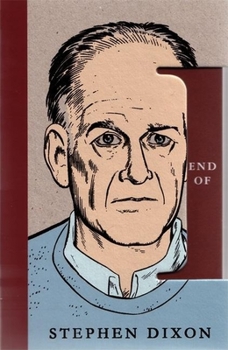End of I.
Select Format
Select Condition 
Book Overview
Three years ago, McSweeney's published Stephen Dixon's acclaimed I. Now, the two-time National Book Award nominee revisits that book's intimate territory, tightening his unflinching focus even as he widens the scope. Dixon is still a master stylist, and the narrator's
tense, breakneck reflections on loss in all contexts are imbued with remarkable urgency and warmth.
Format:Hardcover
Language:English
ISBN:1932416536
ISBN13:9781932416534
Release Date:July 2006
Publisher:McSweeney's
Length:250 Pages
Weight:1.05 lbs.
Dimensions:0.9" x 5.9" x 8.4"
Customer Reviews
2 ratings
Dixon's style is incredible
Published by Thriftbooks.com User , 14 years ago
I sort of stumbled across this book. The McSweeny's label drew me in, and the hardcover cutout of the I in the title of the front flap kept me interested. After reading this book, I now regret not knowing about Dixon sooner. His style sort of reminds me of Hubert Selby Jr., not in the content (Dixon's content is much lighter than Selby), but in the way that he can pack such strong emotions/reactions into very direct and serious sentences. But there's also a strange "playfulness" in his style. The chapter BROTHER is a good example of this. It's hard to explain, but he's telling a memory and he starts, then restarts, then restarts a sentence again and again. But it flows so smoothly that it becomes a piece of written art. In this way, the style made me think of George Saunders and his style of wordplay. This is a great book and I highly recommend it.
Dixon Is Getting Better and Better
Published by Thriftbooks.com User , 17 years ago
End of I. is the third installment in a trilogy of sorts that also includes I. and Old Friends. The middle book, Old Friends, was originally titled Two, but was rewritten before final publication, and its characters given names (whereas the focal character in the other two books was simply I. or He.) But the characters in all three books are clearly one in the same, and, one would assume, autobiographical, since they share many of Dixon's own life circumstances. Like the first two books, End of I. is nonlinear, taking the scattershot trajectory of I.'s memories, instead, as its structure. The book has the valedictory tone of an old man trying to make sense of all he has seen and heard and experienced, but it simultaneously posits an ongoing and healthy future, however fragile it might consider the possibility of that future to be. There is much reckoning with the physical manifestations of aging, especially in the recurring struggles I. has in caring for his wife, who is suffering from a debilitating illness. I. is also wrestling with his own regrets, self-justifications, and so on, often regarding his own admitted selfish desires to carve out time and a private space to write or read or think or carry on his preferred daily routines. An especially pleasing interlude finds I. remembering his mother-in-law's summer visits, which at the time he found intrusive and annoying, but which he now wishes he could relive, and that he could have been kinder and more understanding of her. This is a typical kind of complication of character that the book returns to again and again. I. will simultaneously want and not want something. He will resolve not to do the thing he eventually does, and will wish he had not done it and also be somewhat glad that he had done it. Whatever happens, Dixon seems to be saying, we humans have agency, but then again we don't, and then again, we do. It depends. It's complicated. We are generous and cruel, and both at once. There are reasons we do what we do, but who knows why we do what we do? The writing is Dixon house style, with the long paragraphs and the long back-and-forth of dialogue, and the recursive nature of everything as the characters circle around and around their chapterly predicament (for most of the chapters are thematically driven, and take on a specific inter- or intrapersonal problem from I.'s present, past, or sometimes future.) The writing continues to be experimental as regards form, but not in any sort of annoying showy way. An artful artlessness has crept into the writing in these later books. Dixon does not at all seem concerned with anything except laying bare his character. The result is a deep and growing readerly empathy as the story progresses. You feel like you're living in I.'s head, and feeling everything along with him. Nothing much happens, plot-wise, in End of I. If that bothers you, maybe it's not the book for you. On the other hand, all kinds of things happen, character-wise. By the




